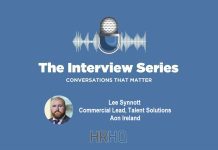HRHQ Sponsored Content
by Barry Cahill, Director of Financial Wellbeing Services,Taxback.com
Most workers in Ireland are worried about their finances.
A recent survey from financial advisor Taxback.com has indicated that half of households intend to buy less this year to counteract rising prices.
Furthermore, nine of every 10 respondents surveyed said that they are feeling the squeeze of increasing home and fuel costs.
With inflation on the rise and the country not yet fully rebounded from the effects of COVID-19, reports of widespread financial stress are hardly a surprise.
However, it is interesting to note that, across the pond in the UK, new data has indicated that individuals who suffer with money worries often find it difficult to maintain high levels of performance while at work.
The study also found that organisations typically experience increased levels of absenteeism when their staff are struggling with money worries.
Many employers in Ireland are not in a position to offer pay increases to their staff in 2022. So, what can be done to support employee financial wellbeing and guard against reduced productivity in the workplace?
Should employers support staff affected by financial stress?
Competition for talent has never been greater and many organisations have reported losing staff over recent months.
Barry Cahill, Director at Taxback.com argues that, by committing to a culture of wellness within the workplace, employers can enjoy many benefits – from improvements in employee morale and productivity to enhancement of staff attraction and retention.
“Many employers are now reassessing employee benefits to see which are most valued by staff in the context of recruitment and retention,” says Cahill.
“Organisations are realising that on-site perks and benefits are no longer as relevant to employees as they once had been.
“Now is the right time to move away from the more trivial aspects of wellbeing – think fruit baskets and free yoga classes – and take action to address the root causes of burnout and stress in the workplace.
“Many people are worried about their household budgets. This is perhaps unsurprising given the current challenging financial environment. And with all of that in mind, it’s clear that financial wellbeing initiatives introduced in the workplace are really going to resonate with staff.”
Cahill argues that, today, talent is attracted by employers who offer real, tangible benefits which enhance their wellbeing.
“Employee’s want to work within organisations where management show that they care for their wellbeing, both inside and outside of the workplace. This includes offering initiatives which support their mental, physical and financial wellbeing.”
Quick wins to enhance employee financial wellbeing
So what practical steps can employers take to alleviate financial stress on their employees?
Cahill says there are a number of basic steps that employers can take to provide rapid financial relief.
“Personal taxation is one area in which employees can look to claw back a significant amount of money,” he says.
“We have found that more than five in ten people do not claim the tax reliefs and refunds they are owed on a yearly basis.
“Our current average tax refund is €1,880. This is a substantial amount of money and would be a fantastic boost to any employee. And the best part is that it only takes a small amount of effort to claim back your tax entitlements.”
Taxback.com partner with companies around Ireland to offer tax review services to their employees.
Over the past 10 months, the company has worked with more than 40 employers across a variety of sectors, ranging from SMEs and family businesses to the Irish operations of multinationals.
“Educating your employees and helping them to claim their tax entitlements can be a quick win and a great way to make a significant difference to an employee’s bank account, says Cahill.”
What kinds of tax reliefs are available to employees?
There are a wide range of tax reliefs available to employees. And, as everybody’s tax situation is different, exactly what an individual can claim will depend largely on their personal circumstances.
However, Cahill argues that almost every worker in Ireland will be entitled to claim tax relief.
“It’s surprising, and somewhat alarming, to find that almost half of us are still not claiming back our tax refund at the end of the year.
“The data speaks for itself – it’s clear that people remain uncertain, reticent, and/or unwilling to approach the topic of their taxes. Many are simply unaware of their tax entitlements while others are worried they will end up owing money to Revenue.
“However, a plethora of tax reliefs are available to workers and this is why it’s a good idea to check what you’re owed.”
So, what kinds of tax reliefs can be claimed?
“Perhaps the most common type of tax relief is medical expenses. This covers everything from GP and consultant bills, physio costs, fees for maternity care, ambulance transportation, nursing home bills and lots more.
“Those that work from home will likely be entitled to claim e-worker tax relief. Here you can get some tax back on a number of common expenses including heating, electricity and broadband. And if you have paid for third level tuition fees, it’s worth checking whether you are due tax back.
“Plus, flat rate expenses are available to thousands of employees who work in many different types of jobs.
“Finally, it’s also important to remember that you can go back four years when claiming tax relief. This increases the likelihood that you will be entitled to claim a substantial tax refund amount back.”
How does a Taxback.com tax review work?
Taxback.com has developed a unique financial support initiative that enables employers to enhance their employees’ financial wellbeing by helping them to claim their tax entitlements.
When an employee registers for their tax review, the Taxback.com team carry out a comprehensive assessment of their tax circumstances and ensure that every applicable tax relief is claimed – guaranteeing that the employee is not only tax compliant but also receiving their maximum Irish tax refund. Conveniently, any refund due is transferred straight to the employee’s bank account.
Employees never have to worry about approaching Revenue themselves or dealing with any complex tax paperwork – Taxback.com manage all of that on their behalf. Plus, the Taxback.com team are online 24/7 to offer further support and answer any tax questions the employee may have.
Learn more about the Taxback.com financial wellbeing service here. Or alternatively, reach out to Barry Cahill ([email protected]) for a free demonstration today.











































